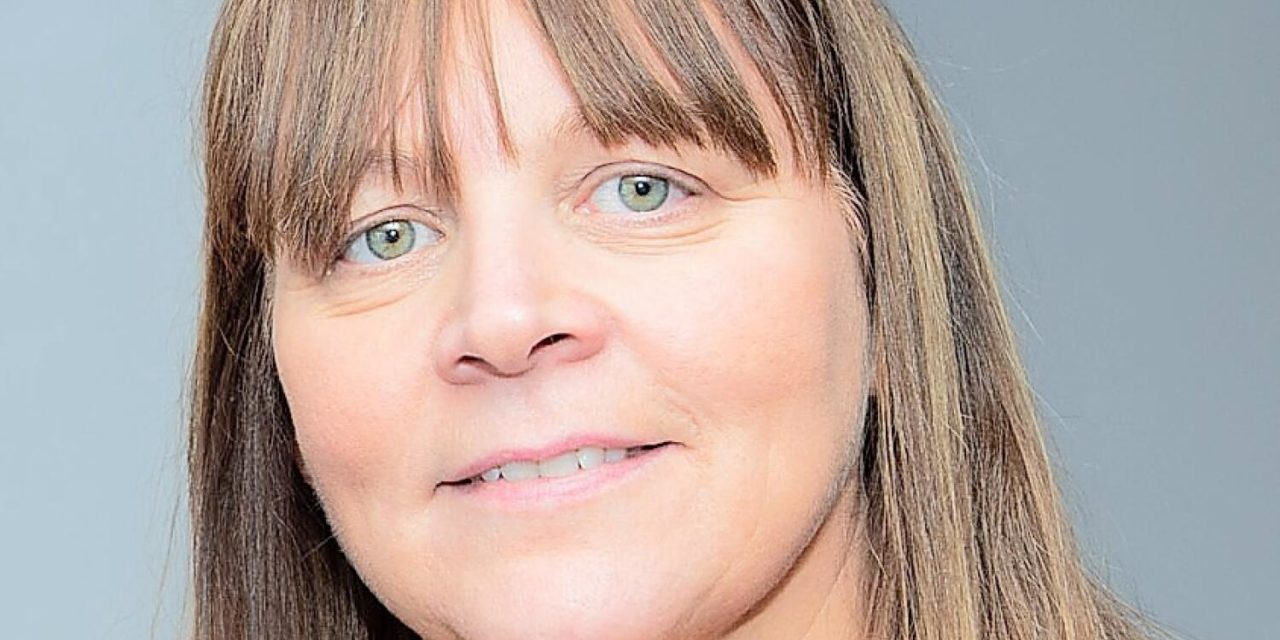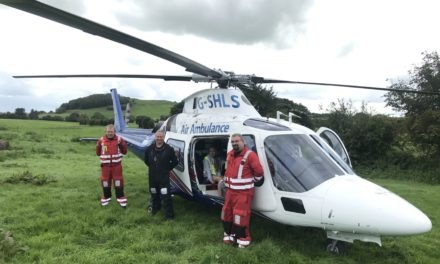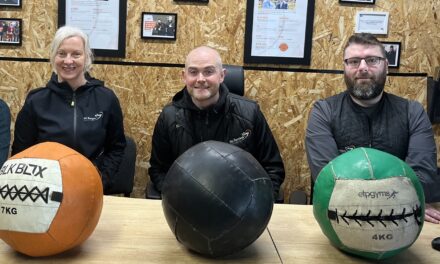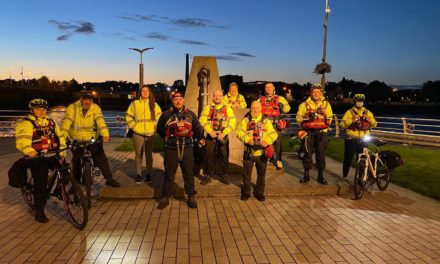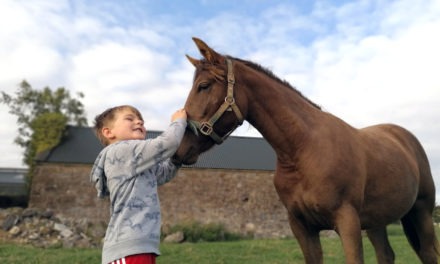The increase in domestic violence during lockdowns and the murder this year of a woman while out jogging, in Tullamore, Co. Offaly, led to a national enquiry about gaps in the level of support provided to women at risk of violence.
Offaly Domestic Violence Support Service was set up in the aftermath of a previous deadly incident in 1997 and it does remarkable and mostly unseen work supporting female and male victims.
Here, Ray Lucey speaks to manager Anne Clarke.
Anne Clarke, manager of Offaly Domestic Violence Support Service, says, “There are women today who are alive by a hair’s breadth.”
It takes more than a moment for that to sink in and it puts an incalculable value on the work done by Anne’s project.
“We are mitigating women’s lives every day,” said Ms. Clarke, adding that they feel “humbled that women and men choose to contact us for support, that they choose to let us guide them through to safety.”
Here is her interview with reporter Ray Lucey, beginning with how Covid highlighted the need for significantly more support for victims of domestic violence:
RL: Was there an increase in people seeking your services durng the lockdowns?
AC: During Covid, we saw our figures rise by just under 50% in 2020 and that stayed on trend for 2021. Our client contacts went up significantly: 829 in 2019, to over 1,700 in 2020 and 2,700 client contacts in 2021.
Clients needed more support during Covid-19 and there were more high risk cases that required more intense attention and more Domestic Violence Orders.
We had clients who had to leave the home quite quickly and there were threats to kill, and use of weapons. Really, there was a huge fear – a lot of women were very fearful in their homes and looked for support.
SUPPORT MEN AS WELL
AC: We had some men having to leave the family home during Covid-19 as well. Our services are a bit different, because we actually support men as well. We are one of the few services that does that – we provide support to both the male and female victims in Ireland.
A lot of the time it is more difficult for the man to come forward because society says – how could you have been harassed, intimidated or bullied by a woman? Society says men should be stronger. That kind of image we have of men makes it harder for a man to disclose abuse, because of that stigma.
WOMEN WON’T LEAVE THEIR COUNTY
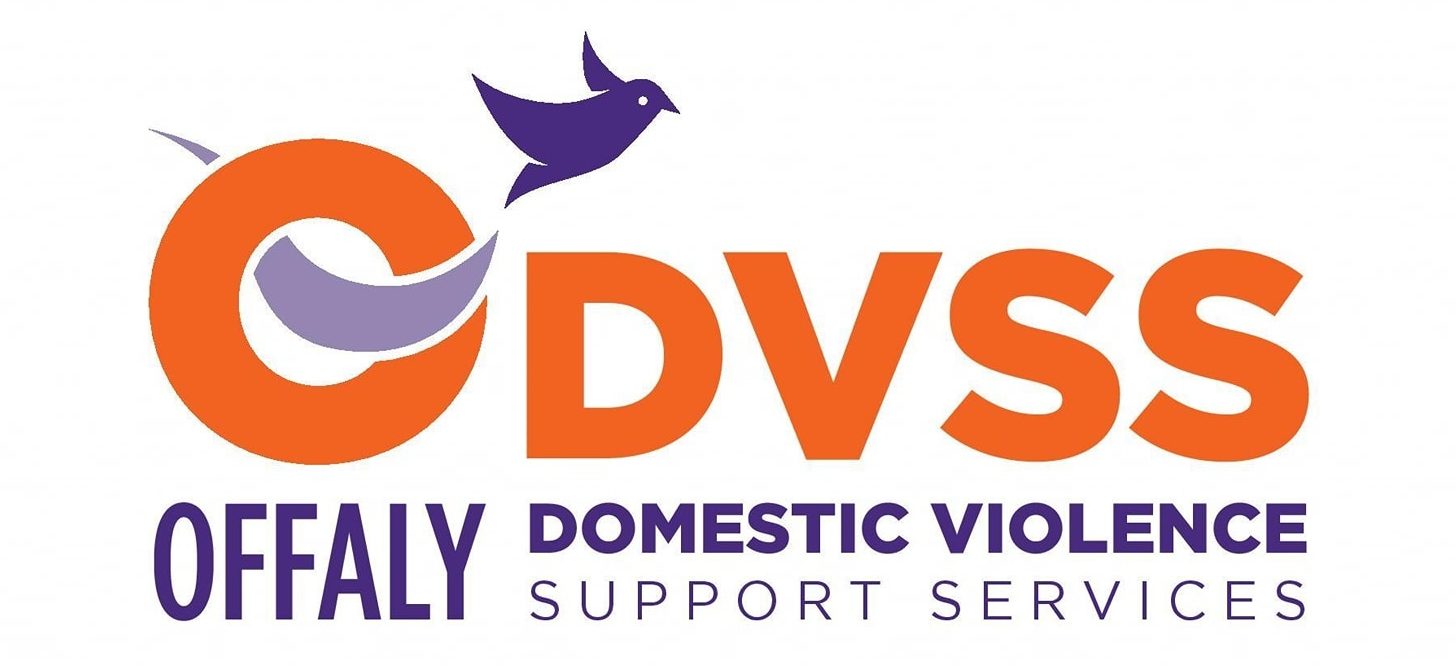
AC: We have no refuge at all in Offaly. We’re a rural county and there’s next to no public transport out of towns and internet access is poor.
I speak predominantly about women because they are over 80% of our clients. A lot of times, women won’t leave their county. They base their decisions on how it would affect their children, if they have to come out of school, miss out on extra curricular activities, supports or family – then they won’t leave.
Therefore it’s really important that we have some form of emergency accommodation. Right now, we’re looking at providing three safe houses in three different parts of the county which means no matter where you are you’ll be in close proximity to your supports and be safe. We’re trying to get that project off the ground and get funding for it.
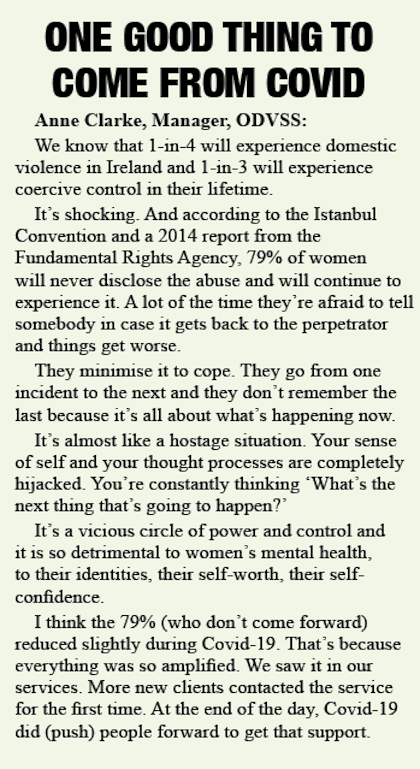
RL: How long has ODVSS been in existence?
AC: ODVSS is marking 25 years this year. It was formed in 1997 after a family lost their niece to domestic violence. A group of women got together once they realised there was nowhere for anyone to go. They started it up from very meagre beginnings and it just grew – into a service now providing one-to-one, emotional and practical contact support in a crisis. We do court accompaniment. We do all the processing and paperwork for the court. We accompany the person into court, and provide support afterwards and we can do remote court hearings.
We ran the same service all the way through Covid-19.
Our support groups moved quickly online. We bought Samsung tablets for clients to access technology and to stay in touch. Our (direct) outreach was reduced during Covid-19 obviously, but is back up again.
We do teen-dating awareness programmes, going into schools to talk about what is healthy and unhealthy in a relationship and what is consent.
We have in-house counselling, providing extra support for clients who need it to recover from the trauma they’ve been through.
We run a ‘Freedom Programme’ twice a year that looks at the various tactics of perpetrators, so you can inform people what the red flags are. If they are going into another relationship, they’ll know how to be able to spot that, but it is also for the professionals – so when the woman talks about the perpetrator they have an understanding of what that means.
We also do ‘Helping Hands’. It’s a programme for children who witness abuse and it really looks at how they can regulate their emotions and feelings.
We have two helplines, one main helpline, and one active during Covid-19. We also have a text support line for those who can’t speak verbally, so they can text and we can text them back.
For a small service in the Midlands we do quite a lot with the budget we have.
TENNESSEE CALLING
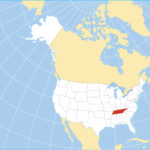
• Tennesse, USA, is a long way from Tullamore.
AC: Across all our social media platforms we constantly get DMs (direct messages). During Covid-19, the amount of women around the world messaging us for support and information was unreal. It’s because our social media is quite strong. Only the other day we got a DM from a lady from Tennessee.
We’re just a small service in Offaly, but we look up their nearest support service and pass that information on to them.
We are contacted from North Carolina, South Carolina, New York, Dakota, Australia, New Zealand, Germany, the Philippines, Scotland, France – it went worldwide during Covid-19 to be honest with you. We couldn’t get over it and we were asking ourselves – how are these people finding out about us? It was because we were very, very active on social media, because we had to keep getting the message out that we were still providing support during Covid and that we are still here.
Staff worked weekends and everything, because Covid-19 offered the perpetrators the perfect storm. They want to isolate their victims from all their support networks, so obviously that was perfect: You couldn’t go 2kms past your house. You couldn’t mix in households.
All the respite stuff and engagements that a person would normally have outside that abusive home were now gone. So our message was that we’re still here, still providing support, that nothing had changed and if you needed help just give us a call.
That message went far beyond Offaly and right around a good part of the world.
HAIRDRESSERS & BARBERS
AC: We also run a lot of awareness campaigns and we run training for hairdressers, beauticians and barbers, because obviously you have a good relationship when you go to the same one for years. They hear things and see things, so we train them.
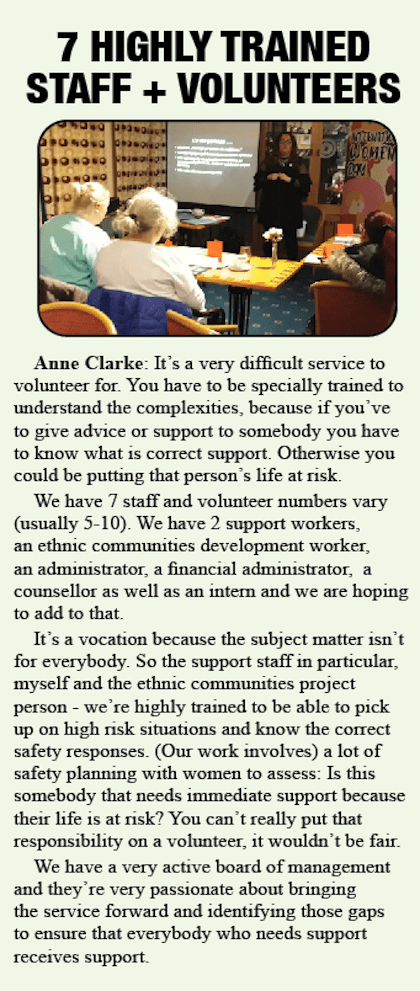
ABUSERS CAN TRAIL VICTIMS INTO WORK
AC: We liaise with businesses regarding domestic violence in the workplace because we know that domestic violence doesn’t stop when you leave your home. Your work can be sabotaged, you can be stalked at work, there can be multiple emails, multiple phone calls. Maybe you can’t go to work because of a beating the night before or you could have high absenteeism.
SAFE WORK SPACES
AC: We work with employers to create safe spaces so people feel able to disclose and know they will get support from line managers and HR. In support of this type of work, there is legislation going through the Dail at the moment that will give 10 days paid leave for victims of domestic violence.
We also give people 24 hour alarms that go direct to the Garda and they have a responsibility to respond very quickly to that alert if it’s pressed.
We do a lot for a small service.
FINANCIAL ABUSE
AC: At least 80% of women who come to us experience financial abuse and that is a huge barrier to leaving the home, so we run a project sponsored by the Giving Circle of Ireland. It’s called ‘Begin Again’ and it gives one-to-one life coaching. It helps those who want to put their CV together, learn interview techniques, and whatever else they need. We’ve had some clients go back to college and some go back to work. We have outside facilitators and a counsellor – there’s a good team behind the whole ‘Begin Again’ service.
POST-SEPARATION ABUSE
AC: A woman is at higher risk when she leaves an abusive relationship and she remains so for 3 to 6 months afterwards. When the perpetrator recognises they’re losing control they increase the abuse even more and shift it up a gear.
It doesn’t (always) stop when you leave; post-separation abuse can be huge and women are re-traumatised going in and out of courts for access and maintenance. Or they’re being stalked, or the children are being used or weaponised by the perpetrator.
But through our support and domestic violence orders and safety planning we can support that person (when) living in the home becomes not an option, because of the level of abuse.
We often hear ‘She’s an intelligent woman’, but it doesn’t matter if you’re intelligent, because if you’re being subtly controlled, sometimes you don’t know until it’s too late. And if the perpetrator is an upstanding member of the community, who’s going to believe you?
RL: Does that often happen?
What we can’t underestimate is that if the perpetrator is so good at grooming you and you fall for it, he’s also good at grooming the community and grooming all the supports around you. So, when you come forward and you disclose something – who’s going to believe you? That’s what women are facing every single day.
The children are often the invisible victims here. They’re dismissed almost. We should have more children’s support. We should make sure that children receive trauma support so we can break the cycle going forward.
RL: Do some kids grow up to do it in later life (become perpetrators of domestic violence)?
It’s sometimes a repeated pattern, yes.
FIRST THOUGHTS ON HEARING OF ASHLING MURPHY’S MURDER
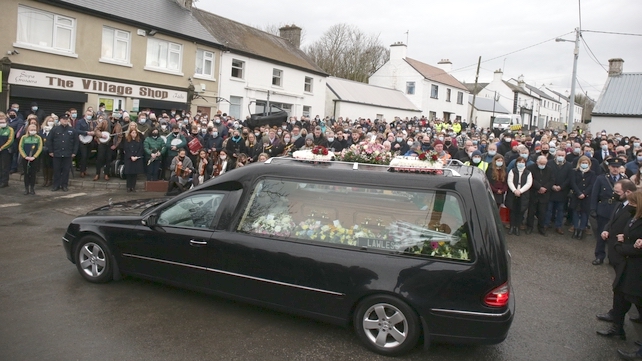
• Ashling Murphy’s funeral. Source: RTÉ.
When staff and volunteers in Offaly Domestic Violence Support Service heard a woman had been murdered in Tullamore in broad daylight, and before they knew who the victim was, they thought it could be somebody they knew through their work.
As manager Anne Clarke said: “Sometimes we go out home on a Friday and hope that some women are alive on Monday – that’s how high risk the violence is in the community. You have women who are being threatened (with murder), threatened with weapons, and there’s physical assault. When it’s really bad women are being beaten within an inch of their lives.
“They’re afraid then to prosecute because of a fear of the perpetrator. The women who are experiencing really high levels of coercive control are totally traumatised.”
She said, “It was shocking to hear about such a random daylight attack, but that level of violence is in the community and is happening in the homes. A home should be a place of sanctuary and should be a place of calmness and safety. Women are terrified. They’re not walking on egg shells, they’re walking on broken glass.”
FOR MORE FROM OUR INTERVIEW WITH ANNE CLARKE, LOOK OUT FOR OUR SPRING 2022 EDITION – OUT VERY SOON.
West Cork’s domestic violence service publishes unique newsletter

